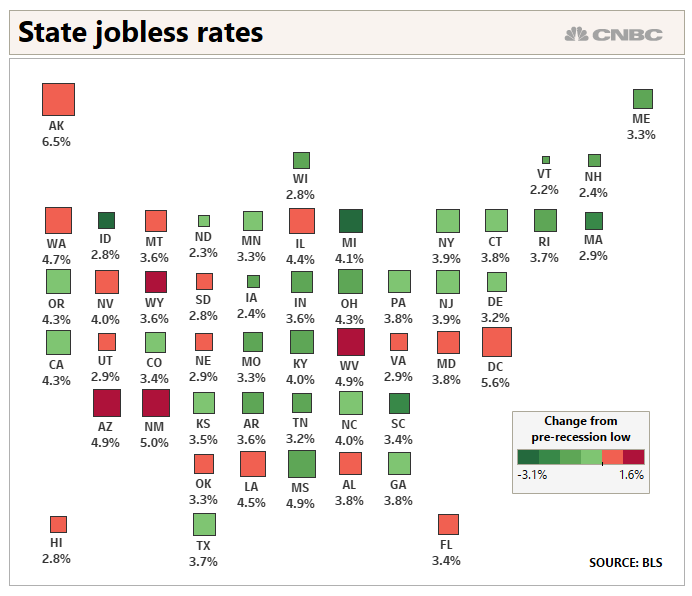Three states, including two big ones for the 2020 election, just set new lows for unemployment - 2 minutes read
A job recruiter wears a shirt showing all of the Wal-Mart Stores Inc. brands during a career fair at the Sheraton Hotel in Philadelphia, Pennsylvania.
Charles Mostoller | Bloomberg | Getty Images
At a time when the national unemployment rate is at its lowest in nearly half a century, three states have set all-time records.
Vermont's lowest-in-the-nation 2.2% jobless rate represents a new historic mark for the Green Mountain state, according to a report Friday from the Bureau of Labor Statistics.
Along with the new low for Vermont, Pennsylvania at 3.8% and Wisconsin's 2.8% set new standards for state unemployment as indicated by records that go back to 1976. Pennsylvania and Wisconsin's fortunes are significant in that they will be key swing states in the 2020 election, during which the economy's performance under President Donald Trump will be a critical issue.

The trends come the same month that the U.S. rate fell to 3.6%, its lowest reading since December 1969.
That national decline came amid a fall in the labor force participation rate, which pushes the headline number lower. However, a more encompassing gauge that also includes discouraged workers, the underemployed and those considered marginally attached to the labor force also held at 7.3%, an 18-year low.
Alaska has the highest rate in the country at 6.5%.
On a state-by-state basis, 10 saw increases in employment in April while only one saw a decrease. The biggest gainers were California (46,000), Texas (28,900) and New York (26,300). Georgia was the sole job loser with a drop of 14,900.
For the full year, 29 states have seen job gains while the rest have been essentially unchanged. The states with the largest growth over the past 12 months were Texas (294,200), California (271,600) and Florida (206,100.)
Over the past year, the biggest drop in the jobless rate came in Delaware, which fell 0.7 percentage points to 3.2%. The only state whose level is higher in the 12-month period is Hawaii, which rose 0.5 percentage points to 2.8%.